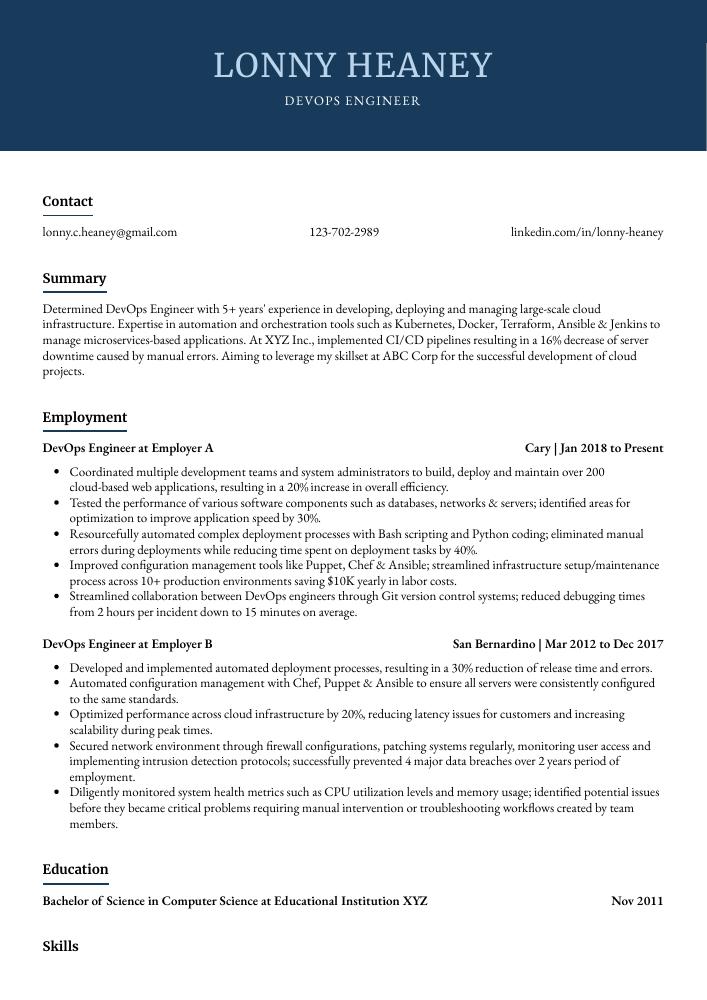DevOps Engineer Resume Guide
DevOps Engineers are responsible for developing and maintaining the infrastructure of an organization. They utilize automation to streamline processes, ensure scalability, and improve system reliability while also monitoring performance metrics. Additionally, they collaborate with other teams such as developers and IT operations personnel to design solutions that meet customer needs.
Your expertise in DevOps engineering is second to none, and any company would benefit from having you on board. However, potential employers don’t know who you are yet. To make them aware of your abilities and experience, writing an eye-catching resume is essential.
This guide will walk you through the entire process of creating a top-notch resume. We first show you a complete example and then break down what each resume section should look like.
Table of Contents
The guide is divided into sections for your convenience. You can read it from beginning to end or use the table of contents below to jump to a specific part.
DevOps Engineer Resume Sample
Lonny Heaney
DevOps Engineer
lonny.c.heaney@gmail.com
123-702-2989
linkedin.com/in/lonny-heaney
Summary
Determined DevOps Engineer with 5+ years’ experience in developing, deploying and managing large-scale cloud infrastructure. Expertise in automation and orchestration tools such as Kubernetes, Docker, Terraform, Ansible & Jenkins to manage microservices-based applications. At XYZ Inc., implemented CI/CD pipelines resulting in a 16% decrease of server downtime caused by manual errors. Aiming to leverage my skillset at ABC Corp for the successful development of cloud projects.
Experience
DevOps Engineer, Employer A
Cary, Jan 2018 – Present
- Coordinated multiple development teams and system administrators to build, deploy and maintain over 200 cloud-based web applications, resulting in a 20% increase in overall efficiency.
- Tested the performance of various software components such as databases, networks & servers; identified areas for optimization to improve application speed by 30%.
- Resourcefully automated complex deployment processes with Bash scripting and Python coding; eliminated manual errors during deployments while reducing time spent on deployment tasks by 40%.
- Improved configuration management tools like Puppet, Chef & Ansible; streamlined infrastructure setup/maintenance process across 10+ production environments saving $10K yearly in labor costs.
- Streamlined collaboration between DevOps engineers through Git version control systems; reduced debugging times from 2 hours per incident down to 15 minutes on average.
DevOps Engineer, Employer B
San Bernardino, Mar 2012 – Dec 2017
- Developed and implemented automated deployment processes, resulting in a 30% reduction of release time and errors.
- Automated configuration management with Chef, Puppet & Ansible to ensure all servers were consistently configured to the same standards.
- Optimized performance across cloud infrastructure by 20%, reducing latency issues for customers and increasing scalability during peak times.
- Secured network environment through firewall configurations, patching systems regularly, monitoring user access and implementing intrusion detection protocols; successfully prevented 4 major data breaches over 2 years period of employment.
- Diligently monitored system health metrics such as CPU utilization levels and memory usage; identified potential issues before they became critical problems requiring manual intervention or troubleshooting workflows created by team members.
Skills
- Linux
- SQL
- Python
- Java
- Amazon Web Services
- JavaScript
- MySQL
- HTML
- Git
Education
Bachelor of Science in Computer Science
Educational Institution XYZ
Nov 2011
Certifications
AWS Certified DevOps Engineer
Amazon Web Services
May 2017
1. Summary / Objective
A resume summary/objective is your chance to make a great first impression on the hiring manager. As a DevOps engineer, you can use this section to highlight your technical skills and experience in automating processes, deploying applications, and managing cloud infrastructure. You could also mention any certifications or awards related to DevOps that you have earned as well as how many years of experience you have in the field. Finally, include some information about why you are passionate about working with technology and what makes you an ideal candidate for the job.
Below are some resume summary examples:
Detail-oriented DevOps engineer with 5+ years of experience in building, deploying and managing cloud-based applications. Experienced at developing automation scripts to streamline the process of provisioning new environments. At XYZ, successfully deployed a fault-tolerant web application architecture across multiple AWS regions while minimizing costs by 20%. Skilled in troubleshooting complex system issues and optimizing performance for maximum availability.
Well-rounded DevOps engineer with 5+ years of experience in developing and maintaining CI/CD pipelines. Experienced in building, deploying and monitoring applications across multiple cloud environments while ensuring maximum availability & scalability. At XYZ Corp., implemented a streamlined deployment process that reduced release times by 25%. Looking to use my expertise at ABC to optimize the software development lifecycle and improve system performance.
Energetic DevOps engineer with 8+ years of experience in automating, configuring and managing production systems for high-traffic web applications. Seeking to join ABC Tech as the next DevOps Engineer where I will contribute my knowledge of Cloud Computing infrastructure, CI/CD pipelines and system monitoring tools towards helping develop highly reliable software solutions. In previous roles have achieved 99% uptime while reducing deployment time by 25%.
Amicable DevOps engineer with 5+ years of experience in automating and streamlining IT operations. Successfully designed, implemented, tested, and maintained reliable systems for multiple businesses. At XYZ Corporation managed over 500 servers across a hybrid cloud infrastructure while ensuring high availability of services to the customers. Adept at scripting languages like Bash/Python/Powershell to automate tasks and reduce manual efforts by 95%.
Proficient DevOps engineer with 5+ years of experience designing and implementing automated CI/CD pipelines, monitoring systems, and infrastructure automation. Seeking to join ABC Tech to leverage expertise in Kubernetes, Terraform, Jenkins, Docker, Ansible and AWS to build reliable cloud solutions that optimize the performance of mission-critical applications. Successfully reduced operational costs by 20% while improving scalability at XYZ Corp.
Dependable DevOps engineer with 5+ years of experience developing and managing systems to increase system reliability, scalability, and cost efficiency. Experienced in setting up CI/CD pipelines for automated deployment & configuration management across multiple cloud platforms (AWS, Azure). Proven ability to develop innovative solutions for optimizing DevOps processes and increasing overall performance.
Committed DevOps Engineer with 5+ years of experience building and managing CI/CD pipelines, deploying applications in the cloud, automating infrastructure tasks, and optimizing system performance. Passionate about leveraging cutting-edge technologies to drive innovation at ABC Tech. At XYZ Corp., improved deployment times by 50% while reducing costs by 25%.
Enthusiastic DevOps engineer with 6+ years of experience in designing, deploying and maintaining cloud-based infrastructure. Skilled at automating processes to increase scalability, reliability, speed and security while reducing costs. Seeking to join ABC Tech to use cutting-edge technologies such as Kubernetes and AWS Lambda for enterprise applications.
2. Experience / Employment
For the experience section, you should list your employment history in reverse chronological order, with the most recent job listed first.
When writing out what you did for each role, use bullet points to make it easier for the reader to digest. You want to provide detail on what you did and any results or accomplishments that were achieved as a result of your work.
For example, instead of saying “Maintained system stability,” you could say, “Implemented automated monitoring tools which resulted in an 85% reduction in downtime.”
To write effective bullet points, begin with a strong verb or adverb. Industry specific verbs to use are:
- Automated
- Monitored
- Configured
- Optimized
- Implemented
- Troubleshot
- Developed
- Deployed
- Refactored
- Tested
- Debugged
- Managed
- Secured
- Analyzed
- Documented
Other general verbs you can use are:
- Achieved
- Advised
- Assessed
- Compiled
- Coordinated
- Demonstrated
- Expedited
- Facilitated
- Formulated
- Improved
- Introduced
- Mentored
- Participated
- Prepared
- Presented
- Reduced
- Reorganized
- Represented
- Revised
- Spearheaded
- Streamlined
- Structured
- Utilized
Below are some example bullet points:
- Implemented automated deployment processes that reduced deployment time by 40% and increased system availability to 99.9%.
- Revised existing software configurations, resulting in cost savings of $25,000 per quarter for servers and cloud services.
- Reorganized infrastructure resources across multiple datacenters to optimize performance; decreased latency times by 25%.
- Managed daily backups & replication tasks with a 100% success rate over the past 12 months; improved security compliance ratings from 65-85%.
- Confidently troubleshot production issues within 1 hour on average using advanced debugging techniques such as log analysis & root cause analysis (RCA).
- Substantially reduced deployment time of software applications from 2 days to 6 hours by automating build, test and release processes using Jenkins.
- Reduced operational costs by 10% over a period of 3 years through strategic implementation of DevOps best practices.
- Deployed multiple cloud-based services such as AWS EC2, Azure Function Apps & Google Cloud Platform for larger enterprise clients in the past year alone.
- Assessed customer requirements and designed appropriate server architectures that met their scalability needs with minimal downtime or disruption to existing systems.
- Represented company at industry conferences and workshops on DevOps topics; received positive feedback from peers regarding knowledge sharing activities conducted across teams.
- Formulated and implemented IT solutions to improve DevOps operations, resulting in a 15% reduction of service delivery times and improved system stability.
- Analyzed existing automation processes within the organization’s development pipelines; identified areas for improvement that resulted in a 20% increase in productivity.
- Debugged complex coding problems across various platforms such as Linux, Windows and Mac OS using scripting tools like Python & Bash; reduced average debugging time by 45%.
- Presented comprehensive reports on project milestones to stakeholders, providing valuable insights into the entire software release process from build-to-deployment stage.
- Accurately documented engineering procedures for future reference use with attention to detail; increased team efficiency by 30%.
- Configured and maintained 50+ servers using Chef and Puppet, ensuring cost-savings of $7000 per month.
- Introduced automated processes for patching, security updates, configuration management across multiple platforms; reduced manual labor by 45%.
- Monitored server performance on a regular basis to identify potential issues before they affected the user experience; successfully averted downtime incidents 98% of the time over two years.
- Reliably managed system deployments in collaboration with development teams while adhering to industry best practices and compliance regulations such as HIPAA/PCI-DSS standards.
- Mentored junior engineers on DevOps engineering principles within an Agile environment, resulting in 30 hours saved each week due to improved efficiency among team members.
- Documented and implemented strategies for improving system uptime and performance, resulting in a 15% improvement in website traffic.
- Advised on best practices to ensure the secure deployment of applications across multiple cloud environments; reduced security vulnerabilities by 30%.
- Compiled comprehensive reports detailing server resource utilization, application usage statistics and user activity data; identified areas needing optimization and reallocated resources accordingly.
- Structured development workflow processes that increased automation efficiency by 40%, reducing manual intervention time spent on DevOps tasks by half an hour per day.
- Independently maintained virtual private servers (VPS) with 100% uptime reliability over a period of six months while handling all system upgrades & patching activities as needed.
- Participated in the development of cloud-based applications and services, resulting in a 40% increase in customer satisfaction.
- Prepared automated scripts for deployments and monitoring, ensuring that system performance is optimized with minimal downtime; reduced server response time from 8 seconds to 2 seconds within 3 months.
- Thoroughly tested software builds before deployment to ensure compliance with user requirements; successfully launched over 50 projects on schedule without any technical issues arising during production phase.
- Facilitated communication between developers, network engineers & operations staff by creating secure channels using DevOps tools like Chef and Puppet; improved collaboration up to 70%.
- Troubleshot systems errors quickly while maintaining high uptimes across distributed networks spanning multiple geographic regions; resolved all critical problems within 1 hour or less on average saving $10k+ monthly costs due to downtimes caused by outages or bugs in codebases.
- Utilized cutting-edge automation tools such as Ansible, Jenkins and Kubernetes to develop scalable cloud infrastructure on AWS, resulting in a 20% reduction in server provisioning times.
- Spearheaded the implementation of DevOps practices across multiple development teams; collaborated with software engineers and system admins to improve quality assurance processes by 50%.
- Proficiently managed Linux servers including installation & configuration of Apache/Nginx web services, MySQL databases and security patches for over 200+ systems daily.
- Expedited deployment process through scripting new Bash scripts & Python programs that reduced manual labor by 80%, leading to faster bug fixes and product updates shipped on time every month.
- Demonstrated expertise in troubleshooting complex problems across distributed systems like microservices architecture via debugging logs or analyzing performance metrics from Grafana dashboards.
3. Skills
Even though two organizations are hiring for the same role, the skillset they want an ideal candidate to possess could differ significantly. For instance, one may be on the lookout for an individual with expertise in Kubernetes and the other for someone with experience in OpenShift.
Therefore, it is important to customize your skills section according to each job posting you are applying for. This will help ensure that applicant tracking systems (ATS) pick up on all of the relevant keywords when scanning resumes, thus increasing your chances of getting shortlisted by a human recruiter.
In addition to listing out technical abilities here, use other resume sections such as the summary or work experience area to provide more detail about them.
Below is a list of common skills & terms:
- .NET
- Active Directory
- Agile Methodologies
- Amazon Web Services
- Ansible
- Apache
- Bash
- Business Analysis
- C
- C#
- C++
- CSS
- Cascading Style Sheets
- CentOS
- Chef
- Cloud Computing
- Computer Hardware
- Continuous Integration
- DNS
- Data Center
- Databases
- DevOps
- Disaster Recovery
- Docker
- Firewalls
- Git
- GitHub
- HTML
- HTML5
- ITIL
- Integration
- Java
- JavaScript
- Jenkins
- Jira
- Kubernetes
- Linux
- Linux System Administration
- Maven
- Microsoft Azure
- Microsoft Exchange
- Microsoft SQL Server
- MySQL
- Nagios
- Network Administration
- Network Security
- Networking
- Node.js
- Operating Systems
- Oracle
- PHP
- Perl
- PostgreSQL
- PowerShell
- Programming
- Puppet
- Python
- Red Hat Linux
- Requirements Analysis
- Ruby
- SDLC
- SQL
- Scrum
- Security
- Servers
- Shell Scripting
- Software Development
- Software Engineering
- Solaris
- Subversion
- System Administration
- TCP/IP
- Team Leadership
- Teamwork
- Technical Support
- Terraform
- Testing
- Tomcat
- Troubleshooting
- Ubuntu
- Unix
- VMware
- VMware ESX
- Virtualization
- Visual Studio
- Web Applications
- Web Development
- Web Services
- Windows
- Windows 7
- Windows Server
- XML
- jQuery
4. Education
Including an education section on your resume will depend on how far along you are in your career. If you just graduated and have no work experience, it is important to include an education section below your resume objective. However, if you have been working as a DevOps engineer for some time now with plenty of different responsibilities to showcase, omitting the education section from your resume might be more beneficial.
If including an education section is necessary, try to mention courses related to the DevOps engineering role that you are applying for.
Bachelor of Science in Computer Science
Educational Institution XYZ
Nov 2011
5. Certifications
Certifications are a great way to demonstrate your proficiency in a certain field. They show potential employers that you have been tested and certified by an organization, which can give them confidence in your abilities.
Include any certifications relevant to the job you are applying for on your resume so hiring managers know right away what qualifications you possess. This will help make sure they take notice of your application and consider it seriously.
AWS Certified DevOps Engineer
Amazon Web Services
May 2017
6. Contact Info
Your name should be the first thing a reader sees when viewing your resume, so ensure its positioning is prominent. Your phone number should be written in the most commonly used format in your country/city/state, and your email address should be professional.
You can also choose to include a link to your LinkedIn profile, personal website, or other online platforms relevant to your industry.
Finally, name your resume file appropriately to help hiring managers; for Lonny Heaney, this would be Lonny-Heaney-resume.pdf or Lonny-Heaney-resume.docx.
7. Cover Letter
Cover letters are a great opportunity to explain why you are the best person for the job. They should be tailored specifically to each role, as this helps employers understand your interest in their organization and how it relates to your experience and qualifications.
Cover letters can range from 2-4 paragraphs long; they provide an introduction of yourself while highlighting relevant skills and experiences that make you suitable for the position. Although not always required, writing one is highly recommended as it allows recruiters to get a better understanding of who you are and what makes you unique compared with other applicants.
Below is an example cover letter:
Dear Rigoberto,
I am writing to apply for the DevOps Engineer position at [company name]. I have a strong interest in working with cutting-edge technologies and am excited about the possibility of joining your team.
As a DevOps Engineer, I have experience automating software deployments, managing server infrastructure, and monitoring system performance. My background has given me a solid foundation in both development and operations, which allows me to effectively communicate with teams across the organization.
In my current role at [company name], I am responsible for managing our AWS cloud environment. I have automated many of our deployment processes using Jenkins and Puppet, which has significantly reduced the time it takes to provision new servers. I also created custom dashboards in Grafana to monitor system performance and identify potential issues before they become problems.
I believe my skills and experience would be a valuable asset to your team. I look forward to discussing how I can contribute to your organization during an interview at your earliest convenience. Thank you for your time and consideration.
Sincerely,
Lonny
DevOps Engineer Resume Templates
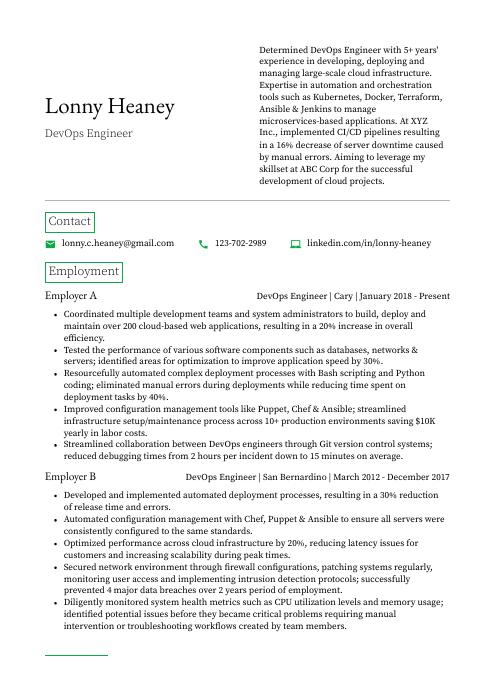 Quokka
Quokka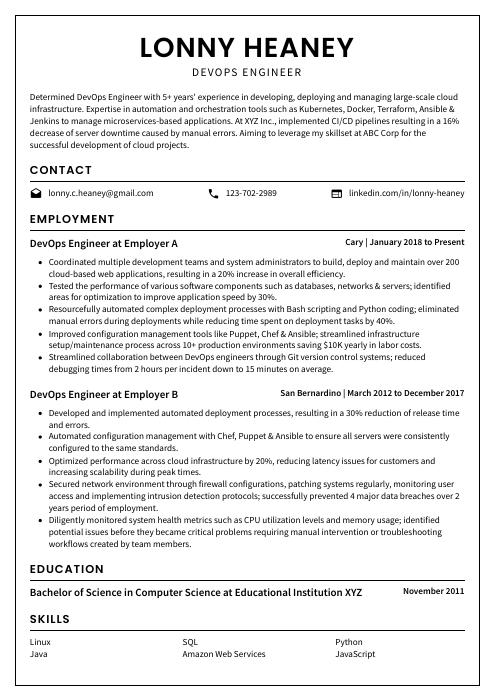 Cormorant
Cormorant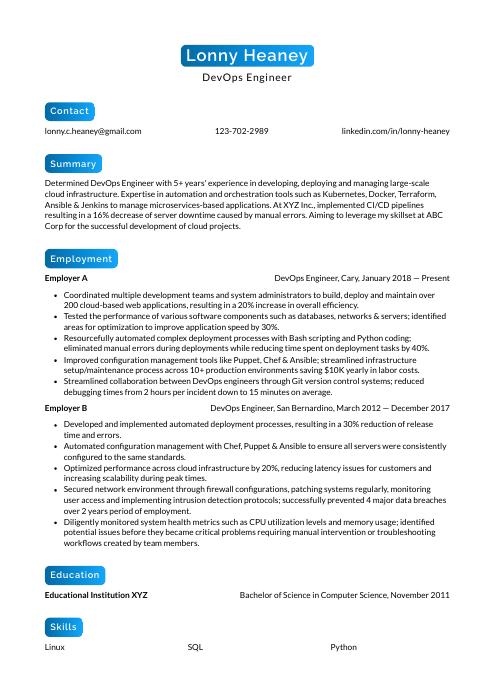 Kinkajou
Kinkajou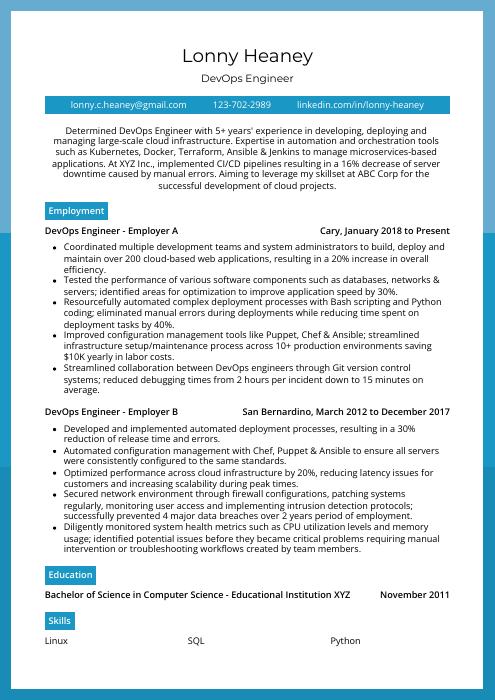 Rhea
Rhea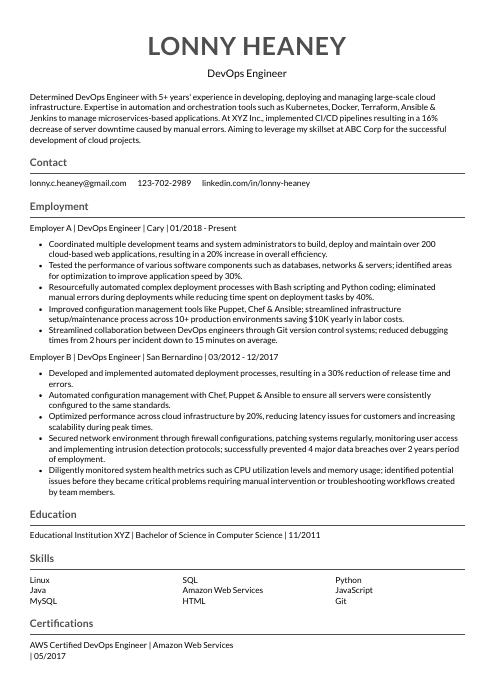 Indri
Indri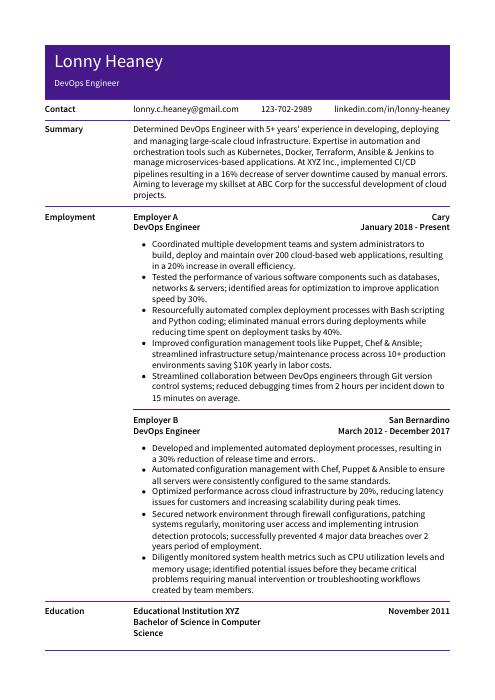 Pika
Pika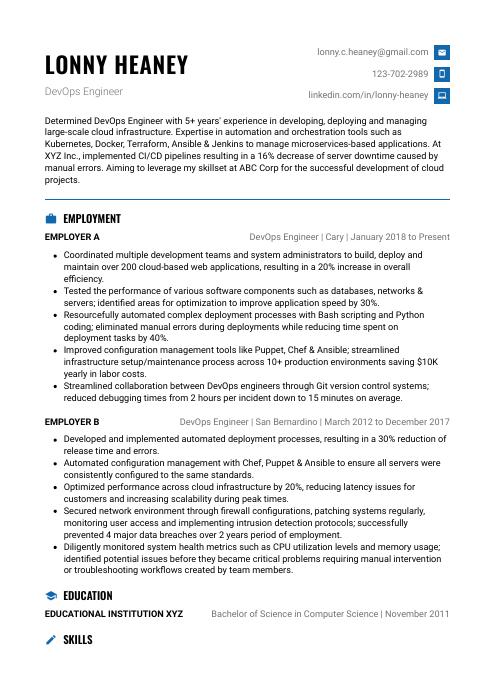 Echidna
Echidna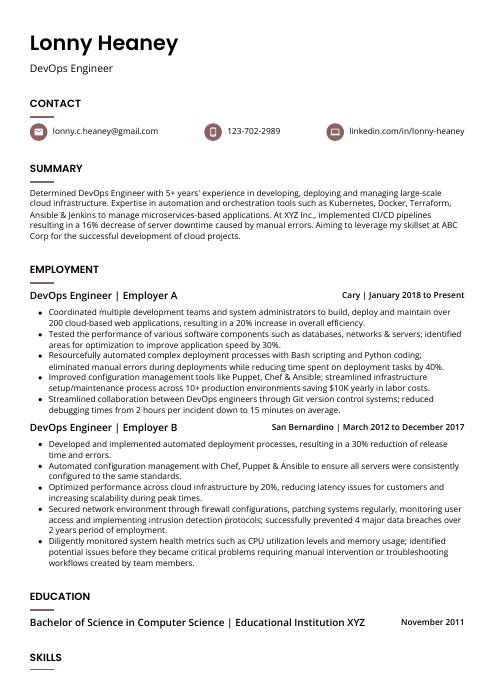 Fossa
Fossa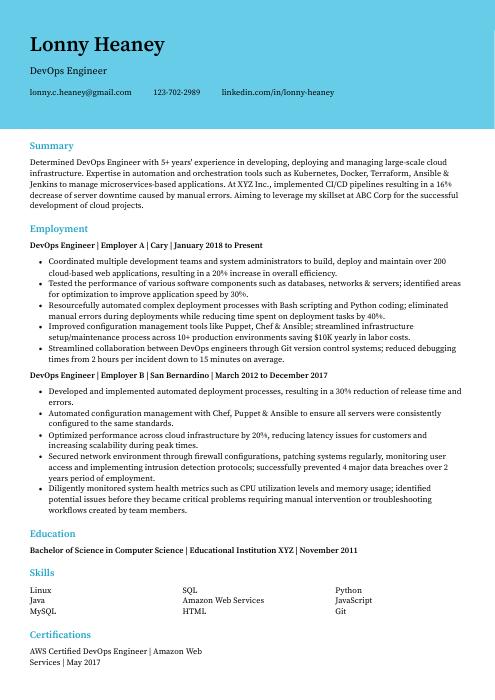 Dugong
Dugong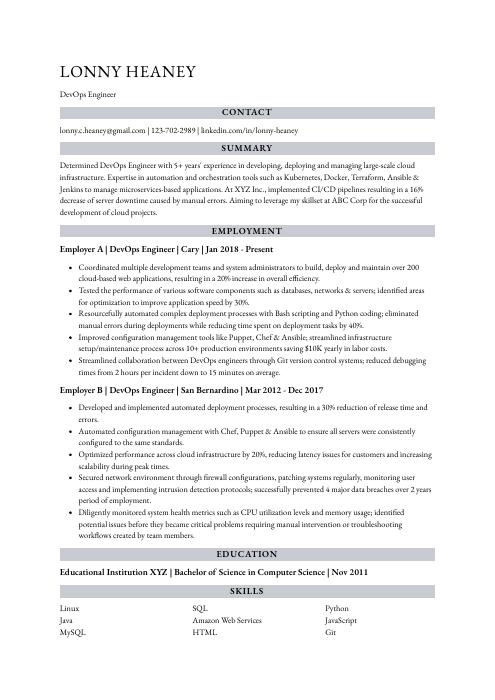 Numbat
Numbat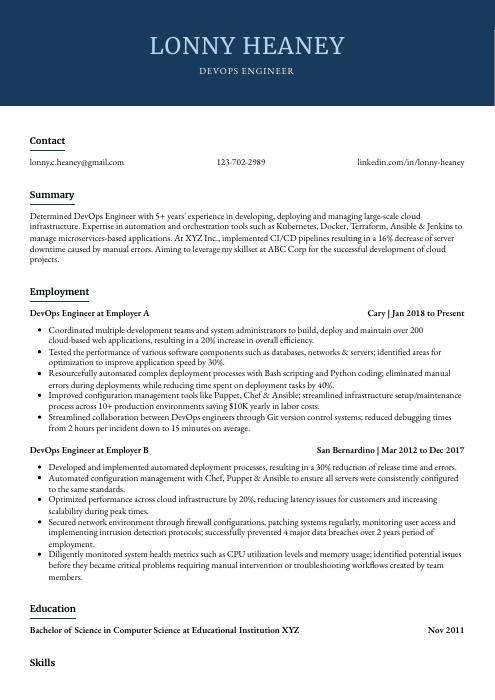 Bonobo
Bonobo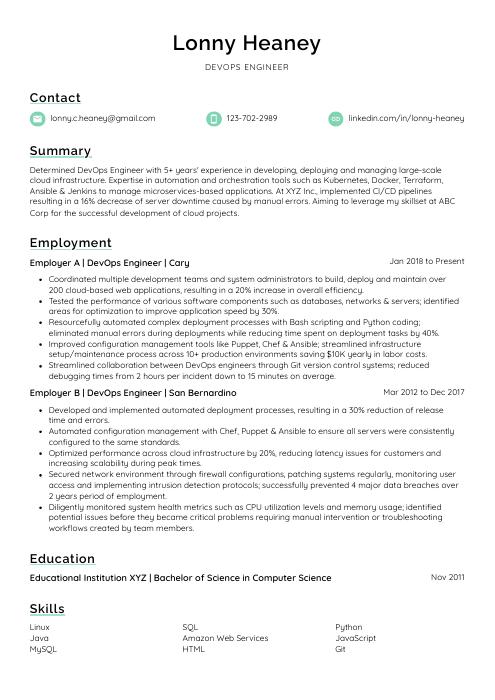 Lorikeet
Lorikeet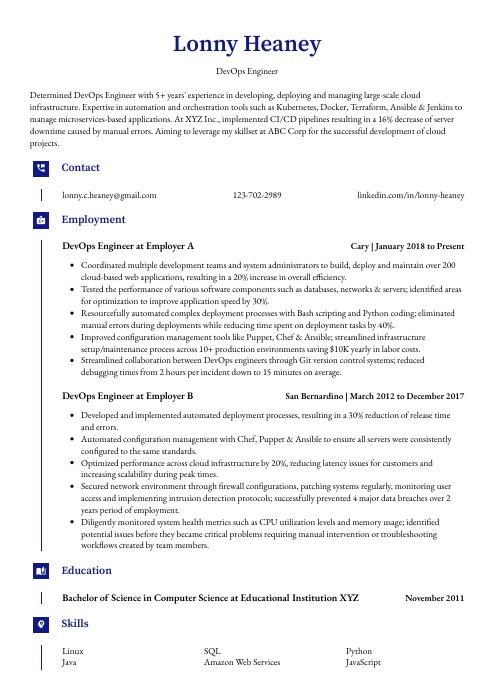 Gharial
Gharial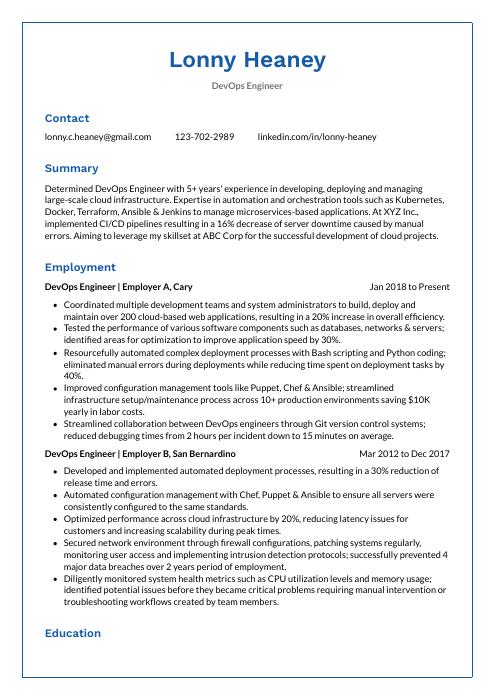 Markhor
Markhor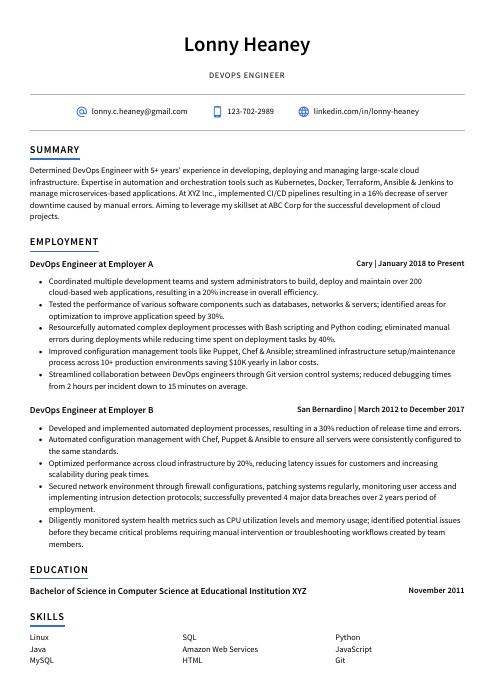 Axolotl
Axolotl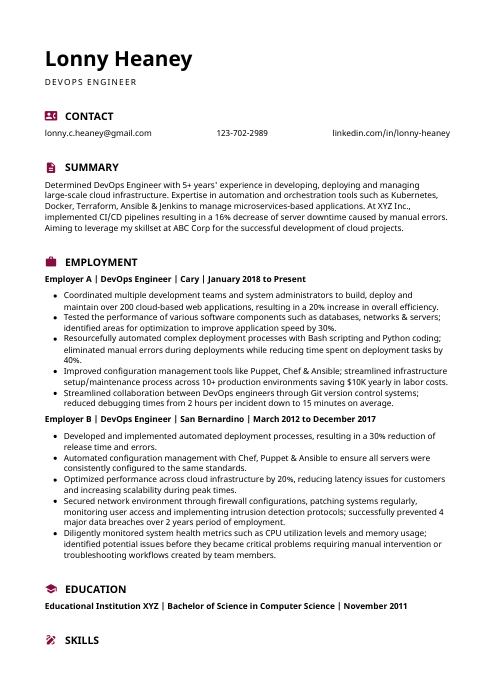 Hoopoe
Hoopoe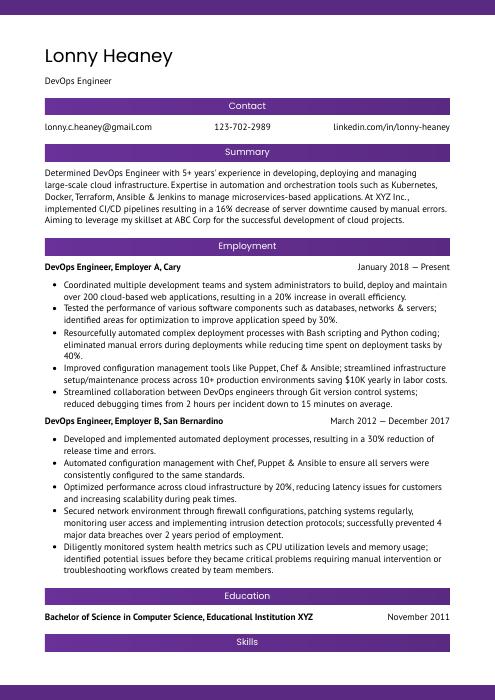 Jerboa
Jerboa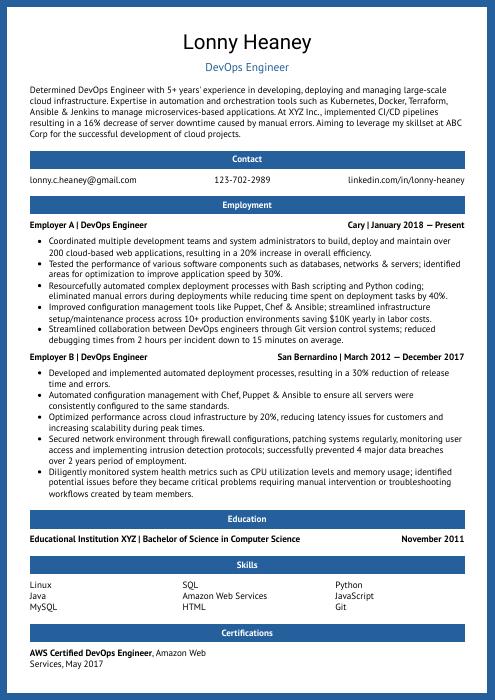 Ocelot
Ocelot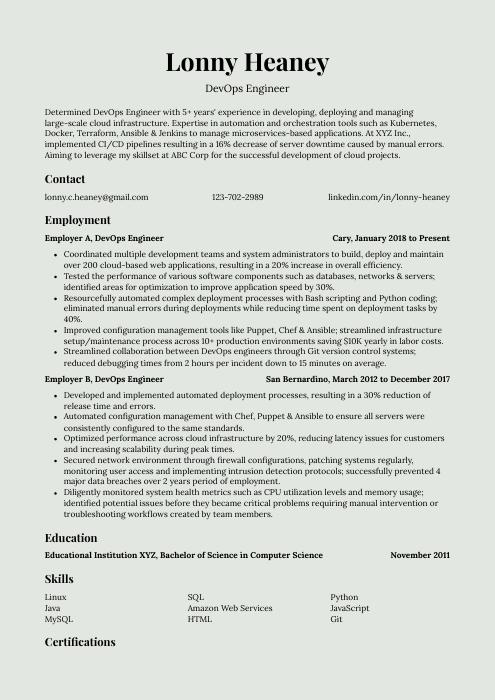 Saola
Saola Rezjumei
Rezjumei
